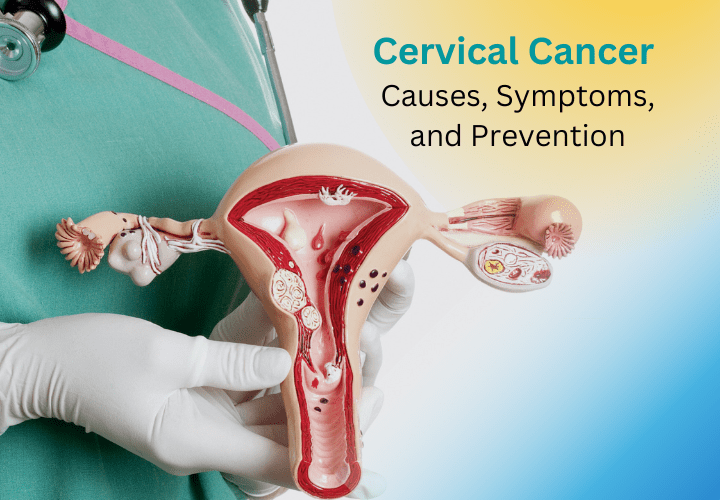How does raising awareness about cervical cancer aid in its prevention?

How does raising awareness about cervical cancer aid in its prevention?
- onco
- January 23, 2023
Cervical cancer is the cause of death among all women. Cervical cancer begins in the cervix’s cells, and the cervix is the narrow end of the uterus. The cervix connects the uterus to the vagina. Cervical cancer grows gradually over time. In this type of cancer, the cervix cells undergo changes, which are termed “dysplasia,” in which abnormal cells start to develop in the cervical tissue. If these abnormal cells are not removed, they will spread rapidly in the cervix and surrounding areas over time. January is cancer awareness month, which is why Oncoplus Hospital raises awareness about cervical cancer, and the best cervical cancer treatment is also available here. In this blog, you will learn about cervical cancer.
Types of Cervical Cancer:
Cervical cancers are of two types: squamous cell carcinoma and adenocarcinoma. Generally, up to 90% of cervical cancers are squamous cell carcinomas that develop from cells in the ectocervix. Cervical adenocarcinomas, on the other hand, are a rare type of cancer that grows in the endocervical glandular cells and is also known as clear cell carcinoma or mesonephroma.
Symptoms of Cervical Cancer:
Usually, cervical cancer is difficult to detect because it doesn’t have symptoms. This is because many women don’t even realize they are suffering from cervical cancer.
In the early stages of cervical cancer, the symptoms that women suffer are as follows:
- When the women have vaginal bleeding after sex or menopause.
- If the regular periods are longer or heavier than normal.
- Women suffer from vaginal bleeding between periods.
- The odor of vaginal discharge is stronger or contains blood.
- If the woman feels so much pain during sex.
In the advanced stage of cervical cancer, the symptoms that women suffer are as follows:
- If there is a pain in the bowel and bleeding from the rectum,
- When a woman experiences pain while passing urine or when there is blood in the urine.
- If a woman experiences abdominal pain or fatigue, consult the doctor.
- Or if there is swelling in the legs.
Factors That Increase Your Risk of Cervical Cancer:
- If a person has a weak immune system, then their body cannot fight HPV infections.
- If the person smokes or breathes in secondhand smoke, this will also increase the risk of cervical cancer.
- If the person becomes sexually active before 18 years of age or if they have multiple sexual partners, then they have a high risk of HPV infections.
- Cervical cancer also occurs in those who use oral contraceptive pills or give birth to many children.
Methods for Preventing Cervical Cancer
According to your age, health, and lifestyle, cervical cancer occurs in women. But some precautions can be taken to prevent cervical cancer. The precautions are as follows:
- Get vaccinated against HPV infections.
There are vaccines available for both adults and young children to protect against HPV infections. It is essential to give the vaccine to a person before they are exposed to HPV. This vaccine will help prevent cervix cancer. Usually, the side effects of this vaccine are mild, such as redness, soreness, and swelling at the injection site. HPV vaccination is recommended for children between the ages of 9 and 12. This vaccination is not recommended for those who are older than 26 years of age.
- Regular Pap Tests:
The Pap test is the best test for the early detection of cervical cancer, and it is also known as a Pap smear. A Pap test can also be combined with an HPV test.
- Visual inspection with acetic acid (VIA):
VIA is a test that is done with a few tools and also with the naked eye. In this process, white vinegar is applied to the cervix. The doctors then observe the abnormalities on the cervix, which turn white when exposed to vinegar.
- No Smoking:
To protect yourself from cancer, you should not smoke, as smoking leads to squamous cell cervical cancer.
Treatment for Cervical Cancer Is Available:
The treatments that are available for cervical cancer are surgery, radiation therapy, chemotherapy, and targeted therapy. These treatments help kill cancer cells.
Everyone should discuss cervical cancer with their doctors and choose an appropriate screening test as a precaution. Screening tests are recommended for people in their early teens, especially those who are at high risk of developing cervical cancer. Oncoplus Hospital is the best cancer hospital in Delhi for cancer patients.
Recent Posts
-
Managing Pregnancy with Chronic Lymphocytic Leukemia
April 30, 2024
-
Signs of Stomach Cancer: Diagnosis and Treatment
April 18, 2024





Leave a Reply